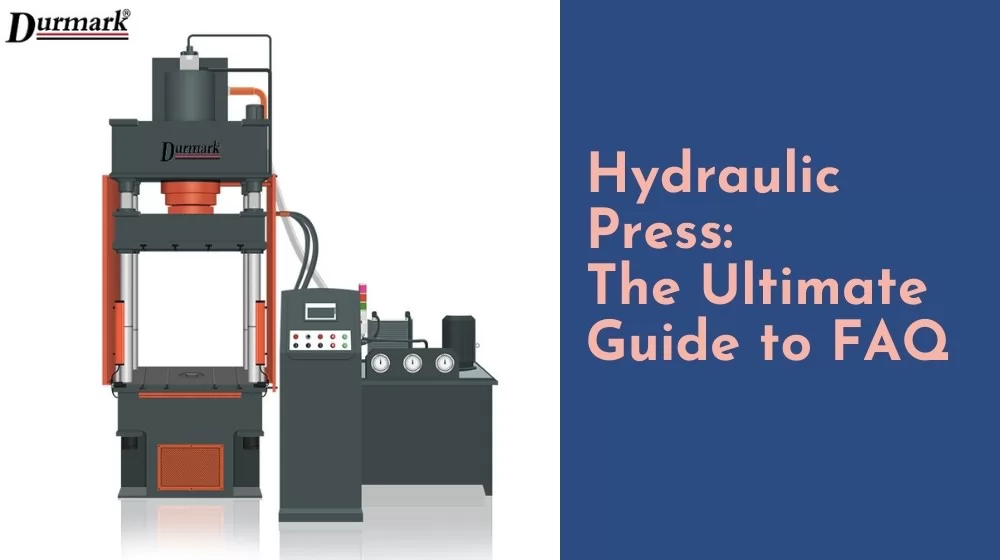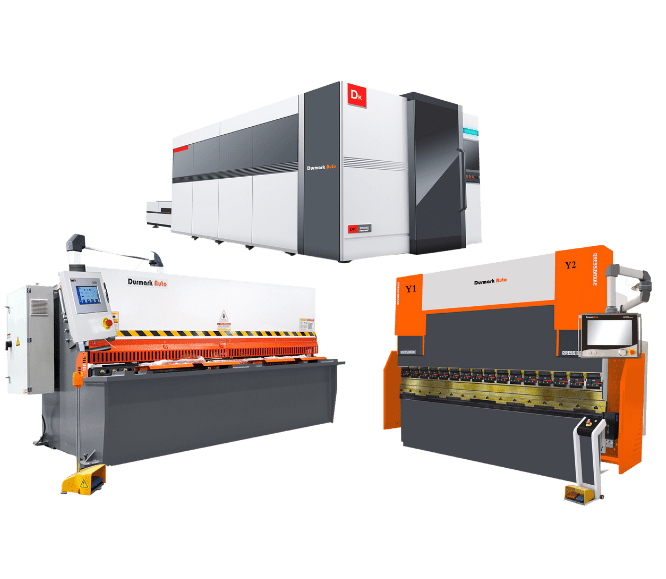
Request a Quote

Request a Quote


As I probably know, you are looking for the best hydraulic press.
Or, you just want to learn more about hydraulic presses.
This guide contains all the information you're looking for, so keep reading to learn more and I'm sure it will help you.
Hydraulic presses are machines and equipment that use hydraulic transmission technology for working pressure production and processing, and can also be used for various forging and pressure forming production and processing. For example, the forging of stainless steel plates, the forming of metal structural parts, the pressing of plastic products and rubber products, etc. Hydraulic press is one of the earliest machines to apply hydraulic transmission. At present, hydraulic transmission has been selected as the primary transmission method for working pressure processing machinery. In heavy machinery and equipment manufacturing, aviation industry, plastics and non-ferrous metal processing industries, etc., hydraulic presses have been selected as important machinery and equipment
According to the structure, it is mainly divided into: four-column type, single-column type (C type), horizontal type, vertical frame, universal hydraulic press, etc.
Large forging hydraulic press is a forging equipment that can complete various free forging processes, and is one of the most widely used equipment in the forging industry.
The hydraulic press is suitable for the pressing process of plastic materials. Such as powder product molding, plastic product molding, cold (hot) extrusion metal molding, sheet stretching, and processes such as transverse pressing, bending, turning through, and correction.
The working range can be expanded, and the three-sided space can be used to lengthen the stroke of the hydraulic cylinder (optional), the maximum retractable 260mm-800mm, and the working pressure can be preset; hydraulic system cooling device.
The machine parts can be assembled, disassembled, straightened, calendered, stretched, bent, punched, etc., so that one machine can be used for multiple purposes. The machine table can move up and down, the size expands the opening and closing height of the machine, and it is more convenient to use.
The double-column hydraulic press is suitable for press-fitting, bending and shaping, imprinting and indentation, flanging, punching and shallow stretching of small parts of various parts; forming of metal powder products and other processing processes. It adopts electric control, is equipped with jog and semi-automatic circulation, can maintain pressure and delay, and has good slider guidance, convenient operation, easy maintenance, economical and durable. According to the needs of users, functions such as thermal instrument, ejector cylinder, digital display of stroke, and counting can be added.
Mechanical presses generate power mechanically, and they run faster than hydraulic presses, which leads to higher productivity. With a mechanical press you can achieve more pressure in a smaller window compared to a hydraulic press.
Hydraulic presses are often used for deep drawing parts. Because compared to mechanical presses, hydraulic presses can achieve consistent pressure over a wider range of strokes.
The most significant advantage of a hydraulic press is that it can generate full pressure anywhere on the stroke. Mechanical presses are inertial and press downward quickly; hydraulic presses are static pressure and can press downward slowly. The mechanical press has good rigidity and cannot be adjusted in speed; the hydraulic press adopts stepless speed regulation, the pressure can be increased or decreased at any time, and the control is convenient. This gives the operator a high degree of control over various operating parameters such as pressure, distance travelled, etc.
While relatively more complicated to set up, standard components for hydraulic presses are relatively inexpensive than standard components for mechanical presses. Repairs and replacements are also cheaper
Hydraulic presses are available in different designs and sizes to suit various applications. This includes the layout of the power system, tonnage requirements, etc. It also allows for a high degree of customization.
The function of the working medium used in the hydraulic press is not only to transmit the pressure, but also to ensure that the working parts of the machine are sensitive, reliable, long-lived and less leaking.
The basic requirements of the hydraulic press for the working medium are:
Has suitable fluidity and low compressibility to improve transmission efficiency;
have good lubricating properties.
Antioxidant, stable performance, long-term work without deterioration.
When shopping for a hydraulic press, the design you should be looking for should be one that is engraved with the design, style, pattern or initials you expect.
You need to do proper market research on the best hydraulic press for you.
This is a key aspect when choosing a hydraulic press as there are many sizes, ranging from small to large.
Therefore, when you need to purchase the tool, you should purchase the corresponding tool that meets your production needs.
Brand is a specification factor to consider before purchasing a hydraulic press.
There are many brands, but the one chosen should be more promising in terms of reliability.
It is recommended to choose a brand that has been tested and has a good market position.
The hydraulic press that has been selected should be value for money and properly serve the intended purpose.
Based on your manufacturing specifications and requirements, you must select the ideal material for your hydraulic press.
It's best to choose the best materials because they are durable enough to give you plenty of time before replacing them.
You should be able to meet the power and voltage requirements of your hydraulic press.
Hydraulic presses should have certifications from relevant agencies.
Hydraulic press type selection There are various types of hydraulic presses, with different stiffness, precision and use. They should be selected reasonably according to the nature of the production process, batch size, mold conditions, and precision requirements. Generally, the crank hydraulic press with convenient operation and high production efficiency can be used for the production of large batches and mostly small and medium-sized parts; for the production of deep drawing parts such as laundry tubs, the hydraulic press for drawing is used.
According to your actual needs, to determine the purchase specifications, you should follow the following principles:
The user needs to figure out what the workpiece is processed by the enterprise, and does it have special requirements for the hydraulic press? At the same time, there is a certain margin, considering the demand after expanding the scale of the enterprise.
The nominal pressure of the hydraulic press must be greater than the stamping process force. However, for processes with long working strokes, it is not only necessary to meet the size of the process force, but also to meet the workload curve.
The number of strokes of the hydraulic press should meet the requirements of productivity.
The stroke of the slider of the hydraulic press should meet the requirements that the workpiece can obtain the required size in height, and can be smoothly taken out from the mold after the stamping process is completed. For tensile parts, the stroke should be more than twice the height of the part. The closed height of the hydraulic press, the size of the working table, the size of the slider, and the size of the die handle hole must meet the correct installation requirements of the mold. For the crank press, the closed height of the mold should be the height of the large die and the small die of the press. between heights. The size of the worktable should generally be 50-70mm (single side) larger than the lower die base of the mold to facilitate installation, and the aperture of the backing plate should be larger than the projected size of the part or waste, so that the size of the leaking die handle should be consistent with the size of the die handle hole.
The price range of hydraulic presses fluctuates greatly, and the prices vary with different models and specifications. Makes a major part of the budget for machine shops of all sizes. From a long-term business perspective, choosing a suitable, high-quality, and guaranteed hydraulic press is the most appropriate, because choosing to buy a hydraulic press at the lowest cost will end up costing more money.
Any manufacturer will encounter this problem when using various types of machinery, improving and maintaining the efficiency of hydraulic presses to maintain higher profits.
Often, the materials used in production and routine maintenance affect the efficiency of production.
Following the rules of use and consistent maintenance have a very important impact on the life and efficiency of a hydraulic press.
There is no doubt that choosing the right and good hydraulic press manufacturer is very important.
Those who do not understand the structural performance or operating procedures of the machine should not start the hydraulic press without permission.
Hydraulic presses should not be overhauled and molds should not be adjusted during the working process.
When the machine found serious oil leakage or other abnormalities (such as unreliable action, noise, vibration, etc.) should stop to analyze the causes, try to eliminate, shall not be put into production: 4.
Shall not overload or exceed the maximum eccentric distance of use: 5.
It is strictly prohibited to exceed the maximum stroke of the slider, and the minimum height of mold closure shall not be less than 600mm.
The grounding of electrical equipment must be solid and reliable.
At the end of each day's work: put the ram to the lowest position.
Often in the hydraulic transmission system, are some relatively fine parts. Everyone on the hydraulic transmission of machinery despite the feeling of labor-saving convenience, but together with the feeling that it is easy to damage. The reason for this is that the primary is not quite understand the operating principle and structural characteristics, and then not quite know the way to prevent the protection. Hydraulic system has 3 fundamental failure elements: pollution, overheating and into the air. These three unfavorable elements have a very close intrinsic link, presenting any one of these problems, will occur in conjunction with one or more other problems. It is proved that 75% of the hydraulic system is caused by these three problems
Electrical wiring is not secure or wrong connection method: check the wiring according to the electrical diagram
Insufficient oil filling in the oil tank to eliminate the method: add oil to the oil level
Exclusion method: Check the oil suction pipe, then run up and down several times and pressurize
Removal method: re-adjust the precision, column surface oiling
Removal method: adjust the pilot valve, use the band pressure is not more than 1Mpa
After stopping the slider slide serious
Cylinder mouth (or piston) seal oil leakage elimination method: check the seal, if there is damage should be replaced
The pilot valve pre-conditioning pressure is too small.
Cartridge valve port seal is not good method of elimination: check the valve port and re-match
There is air in the pressure gauge oil circuit: loosen the joint to bleed when the pressure is on
Mechanical vibration of the pipeline: check whether the pipeline is loose, loose is stuck firmly
Pressure gauge damage: replace the pressure gauge
Pressure compensation variable pump flow rate is too small: adjust according to the requirements of the oil pump
Pump wear or burns to eliminate methods: If the oil pump drainage port oil volume is greater than 4L / min, should be removed for maintenance
Oil leakage within the system elimination method: check the corresponding link in each part
The valve ports involved in sealing are not sealed tightly or the pipeline leaks oil Exclusion method: Check whether the sealing fasteners of the corresponding valves are damaged, and replace them if damaged. Repair and weld the leaking pipeline, and pressurize and debug whether it is normal.
Master cylinder seal damage elimination method: replace the seal ring
The above introduction is only a general description of the general situation, the actual use of the process found after the failure, should first analyze the causes, in the do one by one investigation.
The working oil should be recommended oil, and the oil temperature should be within the range of 15~60 degrees Celsius.
The oil should be filtered strictly before adding to the tank.
The working fluid should be replaced once a year, and the first replacement time should not exceed three months.
The slider should be frequently lubricated, and the exposed surface of the column should be kept clean, and the oil should be sprayed before each work.
The eccentric is too large to make the column strain or other undesirable phenomena.
Check the pressure gauge once every six months.
If the machine is not used for a long time, the surface of each part should be scrubbed clean and coated with anti-rust oil.
As a top hydraulic press manufacturer, we offer many types of hydraulic press products, you can surely find the right price and configuration for you.
We are a Chinese manufacturer of hydraulic presses. Our products are exported to more than 40 countries and regions overseas. We offer a high level of international service and very competitive prices.
With the technical advantages we have accumulated over the years, we can strive for higher cost performance and efficiency for our customers.
.png)



